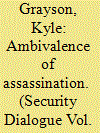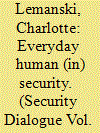|
|
|
Sort Order |
|
|
|
Items / Page
|
|
|
|
|
|
|
| Srl | Item |
| 1 |
ID:
110834


|
|
|
|
|
| Publication |
2012.
|
| Summary/Abstract |
This article begins by presenting a biopolitical account of assassination and targeted killing events carried out by liberal regimes. It argues that forms of political violence are understood and made meaningful beyond the administrative frameworks and technical rationalizations often privileged in biopolitical analyses. Deploying Alan Feldman's (1991) argument that political violence is an 'emplotted action' alongside William Connolly's (2005) notion of resonance, it provides a genealogical account of how forms of assassination have been positioned within Western cultural understandings of political violence. The focal point of examination is the biblical heroine Judith, whose story has resonated as a preferred narrative structure for understanding and (de)legitimating acts of assassination among Western publics. Through its reading of the book of Judith, the article highlights the importance of ambivalence for understanding assassination as a form of political violence. The legacy of the moral problematique enabled by Judith is then illustrated in relation to US President Barak Obama's May 2011 speech announcing the killing of Osama Bin Laden. The article concludes by suggesting that although the story of Judith may underpin contemporary assassination practices, it also offers a means of critically engaging with them.
|
|
|
|
|
|
|
|
|
|
|
|
|
|
|
|
| 2 |
ID:
110833


|
|
|
|
|
| Publication |
2012.
|
| Summary/Abstract |
While the rhetoric of cyber war is often exaggerated, there have been recent cases of international conflict in which cyberspace has played a prominent role. In this article, we analyze the impact of cyberspace in the conflict between Russia and Georgia over the disputed territory of South Ossetia in August 2008. We examine the role of strategic communications, information operations, operations in and through cyberspace, and conventional combat to account for the political and military outcomes of the conflict. The August 2008 conflict reveals some emergent issues in cyber warfare that can be generalized for further comparative research: the importance of control over the physical infrastructure of cyberspace, the strategic and tactical importance of information denial, the emergence of cyber-privateering, the unavoidable internationalization of cyber conflicts, and the tendency towards magnifying unanticipated outcomes in cyber conflicts - a phenomenon we call 'cyclones in cyberspace'.
|
|
|
|
|
|
|
|
|
|
|
|
|
|
|
|
| 3 |
ID:
110836


|
|
|
|
|
| Publication |
2012.
|
| Summary/Abstract |
While human security approaches emphasize top-down security concerns and strategies, urban dwellers in the global South experience (in)security in much more immediate and tangible forms, grounded, for example, in citizens' perceptions and fears related to the security of their lifestyles and cultures, as well as their physical, financial and tenure security. Thus, while human security research and policy focuses on security concerns that occur at the global scale, are linked to spectacular events, and result in security strategies that concentrate on collective human needs and state-led responses, citizens' security experiences take place primarily at the local scale, in terms of everyday practices and individual subjectivities, resulting in citizen-led mitigation strategies. The 'gap' between the security agenda's global scale and urban citizens' local scale is the primary focus of this article, which uses empirical examples from the global South to highlight the ways in which urban citizens from diverse socioeconomic groups demonstrate scales of human (in)security that are under-addressed by the conceptual or policy framework. The article concludes with a call to rescale the human security agenda within the context of the Southern city - to consider the local alongside the global.
|
|
|
|
|
|
|
|
|
|
|
|
|
|
|
|
| 4 |
ID:
110837


|
|
|
|
|
| Publication |
2012.
|
| Summary/Abstract |
Aiming at the measurement, comparison and ranking of all kinds of public dangers, ranging from natural hazards to industrial risks and political perils, the preparation of national risk registers stands out as a novel and increasingly popular Western security practice. This article focuses on these registers and the analytical power politics in which they are complicit. We argue, first, that positing science as an objective determinant of security truth, national risk registers advance a modernist understanding of how knowledge of national dangers can be arrived at, discounting both sovereign and popular authorities; second, that by operationalizing a traditional risk-assessment formula, risk registers make possible seemingly apolitical decisions in security matters, taken on the basis of cost-benefit thinking; and, third, that risk registers' focus on risk 'themes' tiptoes around the definition of referent objects, avoiding overt decisions about the beneficiaries of particular security decisions. Taking all these factors into account, we find that risk registers 'depoliticize' national security debates while transforming national insecurity into something permanent and inevitable.
|
|
|
|
|
|
|
|
|
|
|
|
|
|
|
|
| 5 |
ID:
110835


|
|
|
|
|
| Publication |
2012.
|
| Summary/Abstract |
Since the beginning of the 1990s, there has been growing academic interest in the speech act of apology. Both the nature of apologetic communicative processes and the potential of apologies to promote reconciliation remain, however, under debate. The aim of this article is to map common types of rituals found in what is termed 'the age of apology', to identify the processual and structural characteristics of these rituals, and to understand their contribution to restoring relations in the global arena. The analysis yields three types of rituals of apology: purification - that is, asymmetrical rituals in which the offender issues an apology in order to purify his or her dismal past but does not necessarily need the approval of an offended party; humiliation - that is, asymmetrical rituals in which the offended party forces the offender to participate in a degradation ritual as a condition for closure; and settlement - that is, symmetrical rituals in which both sides strive to restore relations. The theoretical and practical implications of these rituals are discussed.
|
|
|
|
|
|
|
|
|
|
|
|
|
|
|
|
|
|
|
|
|